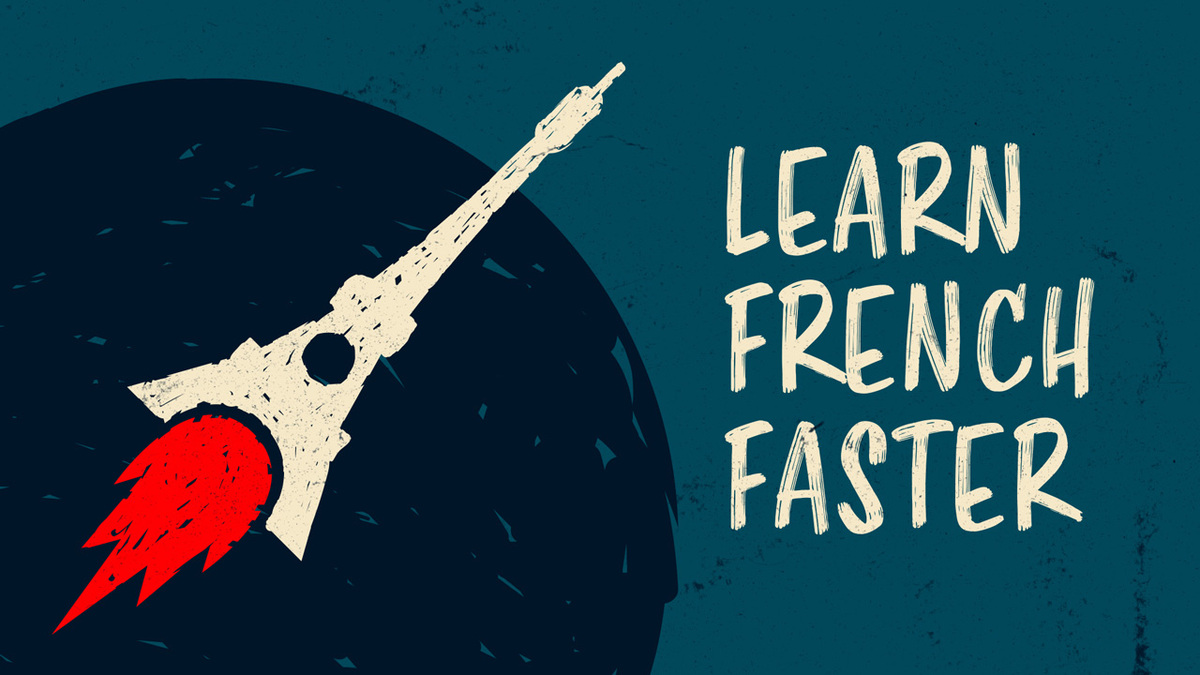How to Speak French: The Faster Way to Learn French
So you want to learn how to speak French? Très bien!! I’m going to show you how to learn French, the fast way.
Millions of language learners around the world are already learning the French language, so you're in great company.
Plus, there are quite a few French-speaking countries (29 to be exact!) where you can practice speaking in Français. Francophone countries like Canada, Belgium, Luxembourg, Haiti, Monaco, and many African countries.
So you can learn to speak French faster than you think. In fact, my speak from day one method is the best way to learn French if you want to speak the language.
Yes, some aspects of French can be difficult, like with any language. But for the most part, French is an easy language to learn.
Follow these steps, and you'll be speaking French before you know it.
Here’s what we’ll be covering:
- How to find your reason and passion for learning French
- How to speak French and immerse yourself without leaving your home
- Creating your own French phrasebook that’s relevant to your life
- Using language hacks to make “difficult” French turn into easy French
- Learn how to have real conversations with native French speakers
- Learning conversational connectors in French to ease into speaking naturally
- How to learn French by focusing on the easy parts
If you'd prefer to listen rather than read, here's a video I made to go along with this article:
Step 1: Fall in Love with French
Lesson: Ask “Why” First – NOT “How/What”
What's the key to speaking French? Passion.
French is the language of love. And to speak any language, you've got to fall in love with it. Or at least find a really good reason to stick with it, even when the going gets tough.
Your big why for learning French will keep you motivated through the ups and downs of learning a new language. It will be something to hold onto whenever you feel frustrated with learning French and start to wonder “What was I thinking?”
Everyone has their own big why for speaking French.
Here are some really good reasons to fall in love with French:
- To travel the world. French is an official language in over 25 countries, and is widely spoken in many more.
- To have conversations with French-speaking family members.
- To read French literary classics (think Victor Hugo, Émile Zola, Alexandre Dumas and Gustave Flaubert).
- To connect with French native speakers.
- To get an inside view of French culture.
Why do you want to learn French? Find your own personal, meaningful reason to study French, and use it to keep you on track throughout your language journey.
Once you know your why, it's easier to stick with the following steps in how to learn French.
Related resources: Flex your French writing muscles, how I learned French on the toilet in 6 months, 121 French words and phrases to talk about your job
Step 2: Create a Mini-France in Your Home
Lesson: Creating an Immersion Environment for Home, Work, or Play (Helpful for all languages!)
It's easier to speak French when you're surrounded by French. But you don't need to live in France to immerse yourself in the language. In fact, you can surround yourself with French wherever you live.
Here are some of my favourite tips you can use to immerse yourself in French.
- Turn your smartphone into a French speaker. Switch the language settings on your phone to French. You can do the same with your computer.
- Look for French speakers in your city. Most cities around the world, big or small, will have a community of French speakers. Chances are, there's one near you.
- Watch French TV and movies. Switch on the subtitles to speed up your learning.
- Read articles and books in French. LingQ is a helpful tool for doing this.
- Listen to French radio and podcasts (my favourite is FrenchPod101). You can learn a lot of French by listening to French songs.
Want to learn more about the immersion from home approach? Then check out how I learned Japanese while living in Spain and Egyptian Arabic while living in Brazil.
Related resources: French YouTube channels to level up your skill, how to learn French with Instagram
Step 3: Write Your Own French Phrasebook
Lesson: Conversational French: 25 Ways to Start a French Conversation
You'll learn French much faster if you focus on words and phrases that are relevant to your life.
Plus, when you have real conversations in French (I'll come to that in a moment), you'll be able to talk about yourself.
That's why I recommend creating a personalised French phrasebook. This is a collection of words and phrases that are relevant to you.
I suggest starting your personal phrasebook with:
- Bonjour! Je m’appelle [name]. Ça va? – “Hello! My name is [name]. How are you?”
- Et toi? – “And you?”
- Parle-moi de toi – “Tell me about yourself.”
- Je viens de [your home country] – “I'm from [your home country].”
- Dans mon temps libre, j'aime [your favourite activities] – “In my spare time, I like [your favourite activities].”
- Je veux apprendre le français parce que [your reasons for learning French] – “I want to learn French because [your reasons for learning French].”
- Je suis [occupation] – “I'm a [your occupation].”
- Qu’est-ce que tu aimes? – “What do you like?”
- J’aime… – “I like…”
- J’adore… – “I love…”
- Je déteste… – “I dislike…”
- Je pense que… – “I think that…”
- Any other interesting information about yourself (Have you learned any other languages? Travelled to unusual places?)
And of course, it’s a good idea to learn some key questions to ask to keep the conversation flowing. Here are some ideas to get you started:
- Est-ce que tu aimes… – “Do you like…”
- Parlez-vous français? – “Do you speak French?”
- Tu parles d’autres langues? – “Do you speak other languages?”
- Comment tu t’appelles? – “What’s your name?”
- Tu es où? – “Where are you?”
- Qu’est-ce que tu vas faire? – “What are you going to do?”
- Je peux t’accompagner? – “Can I join you?”
- Tu voyages beaucoup? – “Do you travel a lot?”
- Tu peux répéter ça? – “Can you repeat that?
- Comment dire…? – “How do you say…?”
- Quoi de neuf? – “What’s new?”
Related resources: French phrases for travelers and tourists, 10 ways to say “How are you?” in French and 10 ways to respond
Step 4: Accept that You're Going to Sound Funny at First When You Speak French
Lesson: French Pronunciation Guide: How to Sound More Like a Native French Speaker
If you've never spoken out loud in a foreign language, it can feel awkward.
This is especially true with speaking French.
French includes sounds that don't even exist in English. When you've only ever spoken one language, forming your lips and tongue into new shapes to make unfamiliar sounds can feel jarring, like hearing a wrong note in a well-known song.
Some language learners let this hold them back. They feel embarrassed about saying things wrong and making mistakes.
Push through this fear by speaking French even when you feel silly. You'll learn French much faster that way.
And trust me, no one's going to laugh at you.
Related resources: 35 free online French language classes and resources, the French alphabet: why it’s easier than you think, French exercises online: 12+ exercises to improve your French language skills
Step 5: Fast-Track Your French with Language Hacks
Lesson: Language Hacking French: How to Learn French, the Faster Way
Language hacks are shortcuts that help you learn a language faster. They're ideal if you want to learn to speak French.
Here are a few of my favourite language hacks that can speed up your French learning:
- Spaced Repetition Systems (SRS). SRS is a great method for memorising vocabulary and phrases using virtual flashcards. My favourite SRS tool, Anki, is free and allows you to create your own flashcards, so you can build a deck from your personalised French phrasebook.
- Mnemonics. A memory palace is an effective way to burn French words onto your brain.
- The Pomodoro Technique. Break up your study sessions into 25 minute chunks. This gives you better focus, so you learn more in a shorter time.
Related resources: How to use social media for instant French immersion, Listen to French: 50+ incredible French listening resources
Step 6: Have Real Conversations with Native French Speakers
Lesson: Speak from Day One
The most effective way to learn a language is to speak from day one. This is especially true if you want tohave conversations with native French speakers.
Where can you find native French speakers to practise with? It's actually really simple.
No matter where you live you can still find people, either online or offline, to speak with in French. I like to search for native French speakers on:
- italki (our review is here). This is the first place I go to find French tutors and pay for one-on-one lessons (reasonably priced).
- Teacher AI which lets you practice speaking with an AI tutor – you’ll get a very similar experience to practicing with a native speaker.
- Meetup.com. Most major cities have a Meetup for French speakers or French learners. CouchSurfing is another of my favourite ways to meet French speakers.
You may also like to join my Speak in a Week crash course to give yourself a huge confidence boost in your French speaking skills after just seven days. It's free.
The best way to begin speaking from day one is to simply learn how to say “hi”! A few German greetings you can use:
- “Hello” – Bonjour or Salut
- “Hey!” – Coucou
- “How are you?” – Ça va?
Related resources: French greetings, 10 ways to say “goodbye” in French
Step 7: Use Conversational Connectors for More Natural Conversations
Lesson: Conversational Connectors: How to Fake Having a Conversation Just After Starting to Learn a Language
Conversations involve a lot more than simply exchanging bare facts. They would be awfully dull if they did. In a world like that, a conversation with a work colleague might go something like this:
You: “How was your weekend?” Them: “It was fine.” You: “Mine wasn't.” Them: “Oh.”
Boring, right?
I bet you don't talk like this in your native language. The same conversation, spoken more naturally, might sound more like this:
You: “So, how was your weekend?” Them: “It wasn't bad, thanks for asking. How about yours?” You: “Actually, it wasn't that great, to be honest.” Them: “Oh, I'm sorry to hear that. What happened?”
See how much better the conversation flows?
Both conversations communicate essentially the same information, but the second one uses conversational connectors. These are short phrases that serve to make the conversation sound more natural, and less jarring and “staccato”.
Here are a few examples in French:
- “To tell you the truth” – à vrai dire
- “In my opinion” – à mon avis
- “By the way” – à propos
- “On the other hand…” d'autre part…
- “That is to say…” – c'est-à-dire…
Related resources: 111 core French words, French slang
Step 8: Focus on the Easy Aspects of French
Lesson: Why French is Easy: How to Understand Spoken French
French really isn't easier or harder to learn than any other language, but you can quickly forget this if you only focus on the difficult aspects of French.
Whenever you get discouraged, think about all of the ways that French is actually an easy language to learn:
French is an easy language because it:
- Has no cases (nominative, accusative, etc), unlike Russian.
- Is not a tonal language, unlike many African and Asian languages.
- Shares a lot of vocabulary with English due to their intertwined histories.
- Uses the Latin alphabet.
- Only has two noun genders, unlike German, which has three.
Remember these facts when you're learning how to speak French, and the tougher aspects of the language suddenly won't seem so bad!
Related resources: Learning French after 10 language fails, 10 good reasons to learn French
You Can Do It!
Everyone who has ever learned to speak French (even native speakers, who learned when they were kids) was once a beginner in the language. They all managed to learn to speak French fluently, and so can you.
You just need to use your French as much as you can. Spend as much time immersed in French as you can. And, most importantly, believe in yourself.
Just remember these important steps:
- Find your “Big Why” for learning French
- Immerse yourself in the French language by creating a Mini-France in your home
- Make smart use of language hacks
- Use conversational connectors to sound more natural
- Speak from day one – especially with native speakers
- Realise that French is much easier than you think
Finally, if you're looking for a structured French course, one of my favourite ways to learn French is with the FrenchPod101 podcast. Check it out here:
Bon courage !





Social